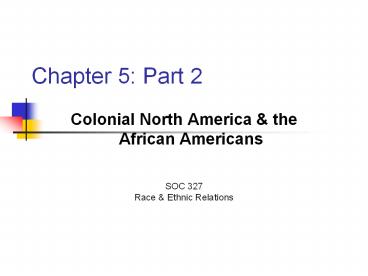Chapter 5: Part 2 PowerPoint PPT Presentation
Title: Chapter 5: Part 2
1
Chapter 5 Part 2
- Colonial North America the African Americans
SOC 327 Race Ethnic Relations
2
The Incorporation of Africans into the Americas
the Atlantic Slave Trade
- The Atlantic slave trade was successively
controlled over four centuries by the Portuguese,
Dutch British - with a parallel French
Exclusive - Triangular, mercantilist, trade circuits between
Europe, Africa, the Americas boats never empty
3
The Forced Immigration of Africans to the Americas
- 100 million directly affected in Africa from
1440s - 1880s - 10-12 million recorded live sales in the
Western Hemisphere - An equal number is estimated to have died in
transit or in capture
4
The Atlantic Slave Trade Destinations
- One third of the African slaves went to
Portuguese Brazil - Another third went to the Caribbean
- Most of the rest went to Spanish America
- Only about 4 to British North America (half of
Haitis percent)
5
The Atlantic Slave Trade the U.S. Slave
Population Anomaly
- The U.S. became the only historical case of slave
population growth - 400,000 sold alive to the U.S. area from 1619 to
1865, most in the 1700s. - About the same number of Blacks were counted in
the first U.S. census of 1790, which is
remarkable. - 4,000,000 were emancipated in 1865
- Between 1790-1865 1000 growth!
6
Evolution of U.S. Slavery Racism
- Plantations tobacco, sugar, cotton
- Initial African servitude became black chattel
slave system by 1700 - Southern social system became caste-like
paternalistic, but based on terror human
trafficking - Fear of slave revolution grew in time
- Ideological racism became scientific 1850s
(Social Darwinism) too late to make a difference
7
Three Reasons for the Remarkable U.S. Slave
Population Growth, 1790-1865
- The invention of the cotton gin gave the stagnant
South a fantastic 2nd. wind huge demand in
England was matched by huge supply from dynamic
US South. - The development of an internal slave trade system
within the South breeding plantations (northern
zone) fed the cotton plantations with an ever
growing supply of slave workers (southern zone). - The exceptional implantation of the one-drop
rule for Blacks fullest system of hereditary
chattel slavery - growth of BOTH Negroes and slaves.
8
Significance of Haitian Revolution to the Americas
- Clarified the national liberation strategy of
the Spanish American settler revolts the
criollos embraced the abolitionist cause and
national independence from Spain. - Made Cuba the new Haiti but now with vast
ingenios based on the steam engine, producing
slaverys most industrial regimented model! - Also blew up 10-year war of independence
(1868-1878) defeated with U.S./British support
9
Significance of the Haitian Revolution
(1789-1804) to the U.S.
- Napoleons dream of settling Louisiana with
re-enslaved Haitian sugar profits vanished, so he
sold it to the U.S. for 15 Million in 1803,
doubling the size of the U.S., a great
geopolitical breakthrough! - Made the Southern planter class even more fearful
of imminent slave revolution, hence more
opressive, while the Northern capitalists became
more convinced that slavery was too explosive and
thus doomed as a modern labor form US national
polarization grew.
10
British Reasons for Ending Atlantic Slave Trade
- Haitian Revolution of 1789-1804 was the writing
on the wall for all of plantation America - British Industrial Revolution favored
machine-made production the wage labor in
Europe new leading commodities manufactured
goods - Incorporation of Africa itself and Asia as
European colonial peripheries in the XIX Century
changed direction and form of colonial migrant
labor flows from intercontinental to
intracontinental - Abolitionist movement in Great Britain gained
momentum homeland liberal democracy at work in
the era of British imperialism yielded fruits
11
The End of the Atlantic Slave Trade in Four
Stages
- Trade unilaterally globally banned by the
hegemonic British in 1807 but - After the 1812 War, the British encouraged U.S.
Southern cotton planters to expand production
using home-grown slaves supported the U.S.
Souths attempt to seceed from the Union - British Caribbean planters given roughly 30-year
period to abolish slavery itself (1834) - Spanish American republics all abolished slavery
- British ( U.S. too) winked at massive Cuban/
Brazilian slave contraband up to the 1880s
12
U.S. at the Crossroads, 1850s/60s
- British hegemony its new industrial / agrarian
global system of accumulation gave the U.S. great
opportunities, but also great challenges over its
own nation-building project - Rise of the manufacturing North became a British
regional rival in N. America ( potentially
global) - Rise of rich Ante Bellum plantation South could
become a British cotton-producing preserve at the
expense of the U.S. North, even secede.
13
Four Strategic U.S. Nation-Building Tensions in
1850s/60s
- Industrial/agrarian core-bound economy vs
agrarian/industrial semiperipheral economy tied
to British core economy - one continental nation vs. 2 or 3 nation-states
- free wage vs. continue with a mixed system of
labor regimes (free/slave) - Build a monoracial nation-state vs. a multiracial
egalitarian plural society vs. a multiracial
inegalitarian plural society
14
U.S. Civil War 1861-1865
- It resolved at a very high price in blood
- Labor system issue waged labor only
- National issue a single, continental
nation-state poised for internal territorial
expansion "Manifest Destiny to establish the
Sphere of Liberty Anglo-Saxon Civilization - Global issue Poised to build a new world power
"Monroe Doctrine" enforced in the Americas vs.
European powers
15
Post Civil War Era
- Left unresolved was the multiracial character of
the new nation-state - Indian genocide military ethnic
cleansingcampaigns reservations - Jim Crow apartheid forced on Blacks
- Mexican-American land usurpation /ethnic
subordination / waves of expulsions - Anti-Asian exclusionary discriminatory laws
from the 1850s until 1960s - Open door policy for non-WASP European
immigrants the new industrial labor force

